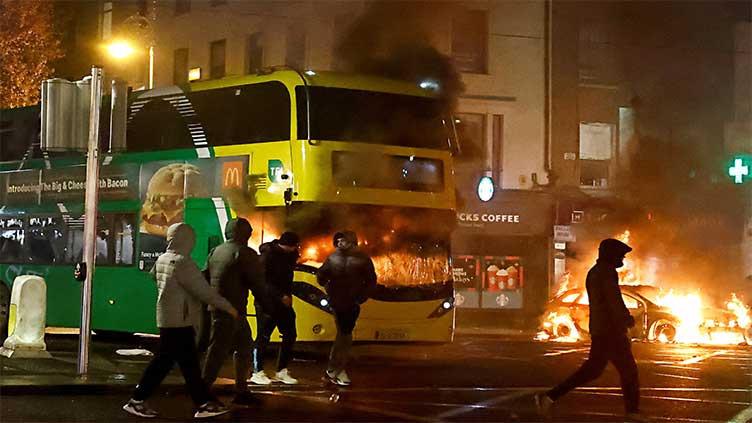Irish PM pledges to modernise laws against hatred after Dublin riots

World
"We will pass new laws to enable the Gardai (police) to make better use of the CCTV evidence"
DUBLIN (Reuters) - Ireland's prime minister pledged to modernise laws against hatred in the coming weeks after 34 people were arrested for rioting in Dublin on Thursday night.
"We will pass new laws in the coming weeks to enable the Gardai (police) to make better use of the CCTV evidence they collected yesterday, and also we will modernise our laws against incitement to hatred and hatred in general," Leo Varadkar told a news conference on Friday.
"I think it's now very obvious to anyone who might have doubted us that our incitement to hatred legislation is just not up to date. It's not up to date for the social media age. And we need that legislation through within a matter of weeks."
POLICE ARREST 34
Irish police on Friday said they had made 34 arrests for rioting in Dublin overnight and that more protests could follow after the stabbing of five people including three young children triggered violence rarely seen before in the capital.
Police guarded looted stores and firefighters cooled down smouldering vehicles in the heart of Dublin's city centre early on Friday after hours of riots which Police Commissioner Drew Harris said he expected to lead to many more arrests.
Police blamed far-right agitators for starting the violence after a small group of anti-immigrant protesters arrived at the scene of the stabbing beside the main thoroughfare of O'Connell Street and clashed with police.
Police have not commented on the nationality of a man detained in connection with the stabbings but there was immediate speculation online that he was foreign.
"We have not seen a public order situation like this before," Harris told a news conference, adding that there would be a very heavy police presence in the city on Friday.
"I think that we've seen an element of radicalisation. We have seen a group of people who take literally a thimble full of facts and make a bathtub of hateful assumptions and then conduct themselves in a way which is riotous and disruptive to our society."
It took officers several hours to regain control after a group of local youths joined the protestors, some of whom were shouting "get them out", with one carrying a sign saying "Irish Lives Matter". The crowd grew to around 200 to 300 people.
People were urged to stay away from large parts of the city during the height of the violence. Harris said 13 shops were damaged or looted, 11 police cars damaged and destroyed along with three buses and a tram. One officer was seriously injured.
Dublin Fire Brigade said firefighters continued to damp down a smouldering tram on O'Connell Street on Friday morning and make the scene safe. Public transport resumed, but with restrictions in the area.
Barricades were up across some shopping streets where Black Friday sales were due to take place. Police stood guard outside a Foot Locker store with broken windows that was looted during the riot. The front of a Holiday Inn hotel was boarded up.
A five-year-old girl was receiving emergency treatment after sustaining serious injuries in the stabbing.
Harris said the girl remained in a very serious condition with a female teacher in her 30s also in a serious condition.
The two other children, a five-year-old boy and six-year-old girl, suffered less serious injuries.
The detained man in his late 40s, also being treated for serious injuries, was detained by police who said they were not looking for any other suspect.
Harris said police had not ruled out any motive, including whether it could be terror-related.
There are no far-right parties or politicians elected to Ireland's parliament, but small anti-immigrant protests have grown in the last year.
The government is reviewing security around parliament after a recent protest trapped lawmakers inside.


